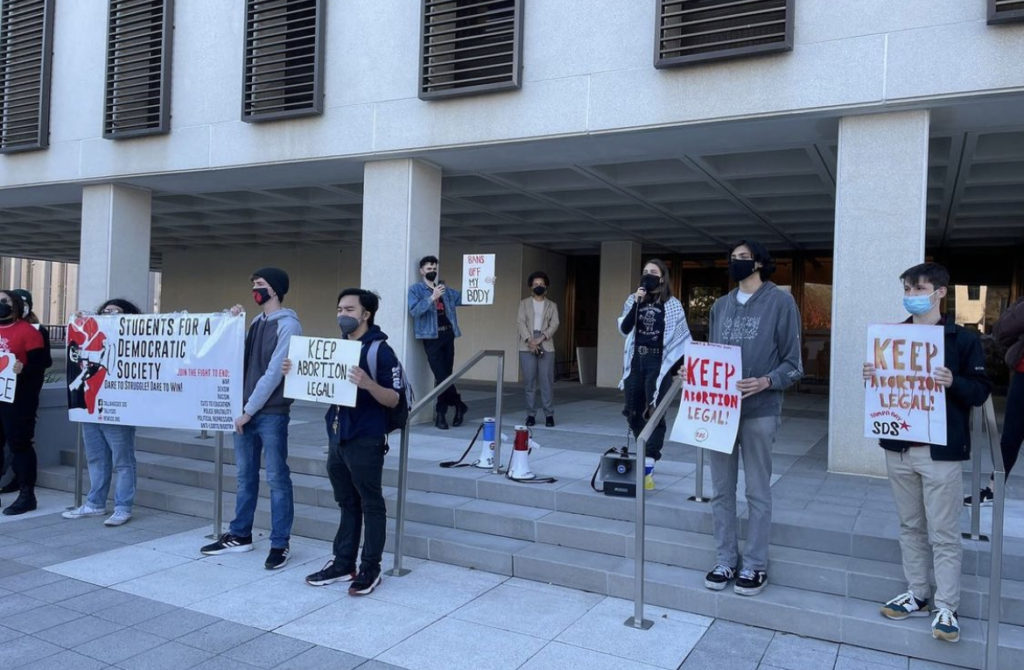Taking effect on July 1, the law will shorten the legal timeframe for an abortion from 24 weeks to 15 — challenging precedents set by Roe v. Wade.
Courtesy of AP Photo
By Molly Ryan
In a historic signing last Thursday, Gov. Ron DeSantis approved the strictest anti-abortion legislation Florida has seen since Roe v. Wade.
House Bill (HB) 5, the Reducing Fetal and Infant Mortality Act, restricts most abortions after 15 weeks of pregnancy, with exceptions only to those whose health may be at risk or with a baby that has a “fatal fetal abnormality.”
The bill shortens the legal timeframe to receive an abortion from 24 weeks, established by Roe v. Wade in 1973, to 15.
The new law, which does not allow exemptions for cases like rape, incest or human trafficking, will take effect on July 1.
“[HB 5] protects babies in the womb who have beating hearts, who can move, who can taste, who can see and who can feel pain,” said DeSantis, according to a news release. “I am proud to sign this great piece of legislation which represents the most significant protections for life in the state’s modern history.”
First brought to the Florida House of Representatives in January by Rep. Erin Grall, R-Vero Beach, and Rep. Jenna Persons-Mulicka, R-Fort Myers, the bill appealed to Florida’s Republican-majority legislature.
Later that month, students from the University of South Florida’s chapter of the Students for a Democratic Society (SDS) protested the bill during a committee meeting in Tallahassee alongside chapters from the University of North Florida and Florida State University.
While students were able to share public testimonies, emphasizing their concerns about the bill, Bryan Avila, R-Miami Springs, chairperson of the Health Care Appropriations Subcommittee, closed public comment after less than half an hour “in the interest of time” while an SDS member was speaking.
SDS members like Victoria Hinckley, a sophomore sociology major at the Tampa campus, were pulled out by security after the group began chanting “Let her speak” in protest to Avila’s decision to send the meeting into recess.

“HB5 is a major blow to reproductive rights, especially to people of color and working-class individuals which is who this bill will have the most impact on,” Hinckley said.
“Over 70% of Florida was not in favor of the bill yet it still passed. That is completely reflective of SDS’ experience in Tallahassee on both occasions,” she said. “We were violently silenced and repressed by people that claim to care about freedom.”
Under videos of the incident on the USF SDS chapter’s Instagram account (@TampaBay_SDS), the caption said, “We condemn this act of political repression and will continue to fight for reproductive rights… Along with us and every other public comment being against the bill, the members of the subcommittee truly spit in the face of democracy by voting in favor of this bill.”
On March 3, the bill went on to pass through both Florida’s House and Senate.
Florida is the latest state to join the wave of anti-abortion legislation throughout the nation.
In 2018, Mississippi became the first state to outlaw any abortions after 15 weeks of pregnancy.
Since 2020, West Virginia, Arizona, Kentucky and now Florida have put forth legislation nearly identical to the 2018 law. Other states like South Carolina, Texas and Idaho have been more ambitious in banning abortions after six weeks of pregnancy.
Last Tuesday, two days prior to the signing of Florida’s HB 5, Oklahoma Gov. Kevin Stitt signed off on the most restrictive anti-abortion legislation in the country.
If authorized by the state’s Supreme Court, Oklahoma’s Senate Bill 612 will effectively outlaw all abortions — the only exception extending to pregnancies that endanger the life of the pregnant person — and make them a felony punishable by up to 10 years in prison and a $100,000 fine. The bill would take effect in August.
However, legislation at odds with Roe v. Wade is not on completely stable grounds.
The Mississippi legislation is currently being reviewed by the U.S. Supreme Court in Dobbs v. Jackson Women’s Health Organization, with a decision to be reached before the current term ends this October.
According to NPR, “justices in the six-member conservative majority appear willing to uphold the law.”
If upheld, all recent and upcoming legislation could profoundly weaken or annul Roe v. Wade — barring the right to receive an abortion at any point in a pregnancy’s first trimester.



